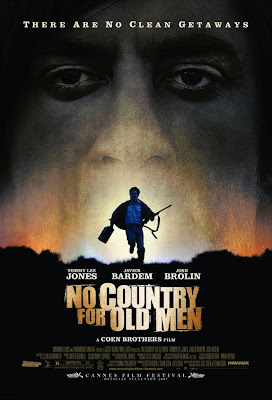The story revolves around a drug deal gone bad on the desolate prairies of west Texas, near the Mexican border. While hunting antelope, Llewelyn Moss (Josh Brolin), a Vietnam veteran making a meager living as a welder, stumbles upon the grizzly aftermath of a shootout. Amid the carnage, he finds a pickup bed filled with heroin and a satchel containing two million dollars. Knowing the risks involved, Llewelyn figures that his ship has come in; with this windfall, he and his wife, Carla Jean (Kelly Macdonald), can retire from their menial jobs.
Of course, there are other parties with different ideas. On the one side is the Mexican gang, armed with machine pistols and pit bulls; on the other is the American gang, headed by an unnamed executive (Stephen Root), who hires a professional killer, Anton Chigurh (Javier Bardem) to track down the missing money.
 |
Tommy Lee Jones as Sherriff Bell |
That's as far as I'll go in revealing the plot. This film is too delectable to risk spoiling it by revealing more.
The performances are outstanding, from top to bottom. Most especially, the three primaries, Bardem, Jones, and Brolin are at the top of their game. Bardem's portrayal of a sociopathic killer, enslaved by his own twisted ethos, is positively hair-raising. And Brolin conveys the quiet pride of a fiercely independent and basically decent man so well that it is impossible not to root for him. For Jones, the role of Sheriff Bell must be somewhat familiar (think back to his role as Woodrow Call in the Lonesome Dove series). But Sheriff Bell is far more complex than other similar characters: bemused and uncertain, teetering on despair. Jones conveys Bell's precarious emotions masterfully in the set of his shoulders, the wrinkling of his brow, the resignation of his tone.
Dread and apprehension pervade the film, as we watch Chigurh ruthlessly and efficiently track Llewelyn, both of them contending not only with each other, but with the Mexican gang. The lack of a musical score adds to the viewers anxiety; there is no cuing of emotions with swelling violins, no release provided in crunching electric guitars. Rather, the viewer must endure, agonizingly, the creak of floorboards as a killer progresses through a dark hallway; the deadly serious click of a gun hammer being cocked. The cinematography is unrelenting in its use of shadow and stark light, and the many sweeping shots of desolate Texas wilderness reinforce the cruelty and bleakness of the world in which the viewer finds himself.
As with nearly all the Coen Brothers films, the writing is close to flawless. The dialog is powerful and vivacious. Every line is significant. Between the acting and the writing, the west Texas dialect is delivered convincingly.
All of the characters remain true to their respective belief systems. And throughout the film, the viewer wrestles with the implications of those beliefs. Each character, whether the bewildered man on the side of the highway, or the cocky bounty hunter, Carson Wells (Woody Harrelson), provides another facet through which to examine the impossible questions raised as the story progresses.
Are we merely puppets whose actions and thoughts are governed by laws that we can't understand? Or do we have choices? Can we affect outcomes?
Chigurh's belief regarding those questions is revealed in a conversation he has with a potential victim. He flips a coin, then tells his victim to call it. The outcome of the call will determine the victim's fate.
The victim considers for an instant, then, in a sudden epiphany (delivered with all the conviction of a character from a Flannery O'Connor story) declares "No, I won't call it. The coin don't have no say. It's you."
Chigurh brushes that aside, his expression revealing disappointment and impatience. "I got here the same way the coin did," he says.
This is the best film I have seen in quite some time. It's not a film I would recommend if you are bothered by cinematic violence. But it is an outstanding film. I give it my highest recommendation.


